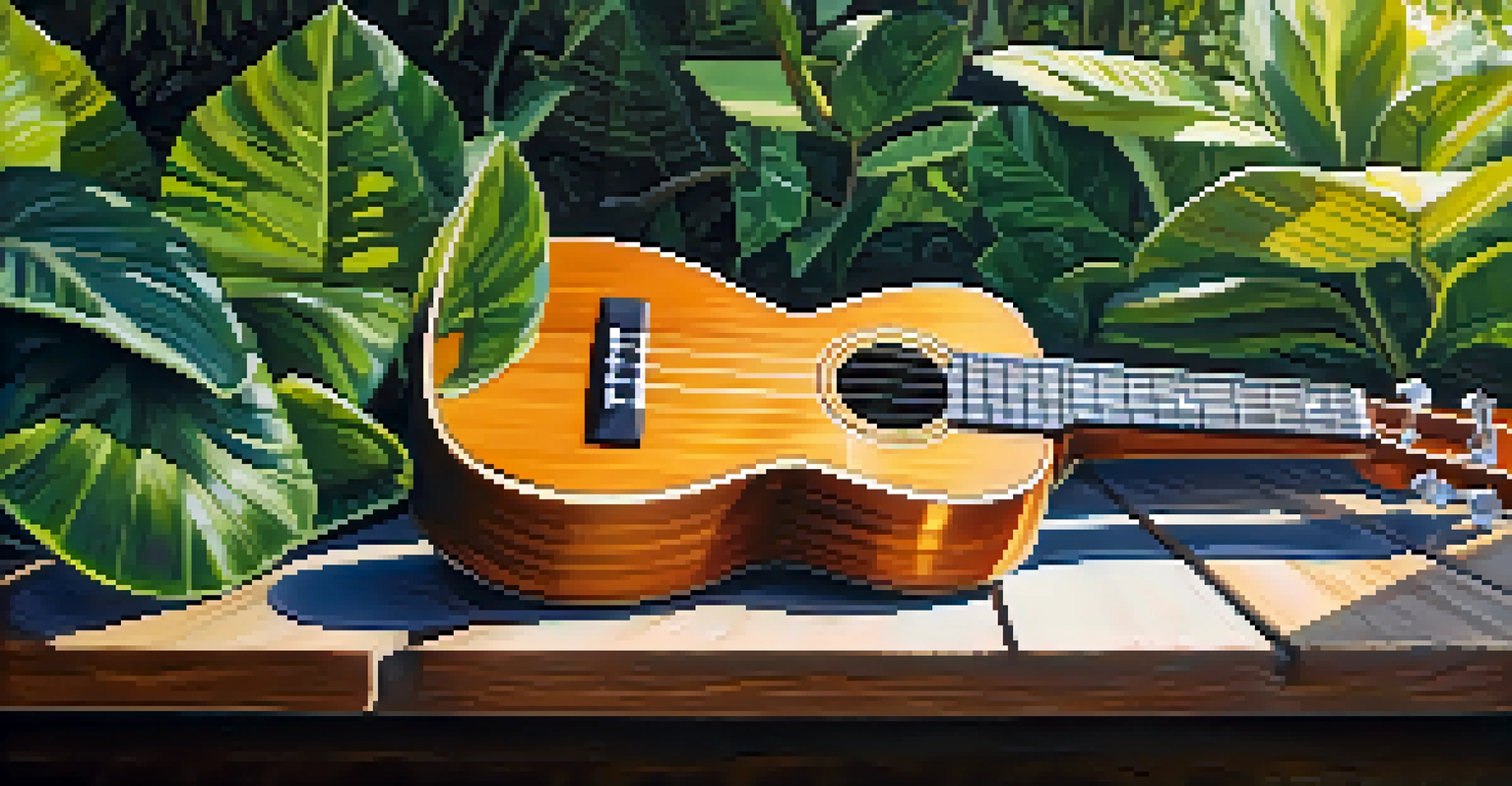How the Ukulele Became a Symbol of Joy in Music Cultures

The Origins of the Ukulele and Its Joyful Sound
The ukulele originated in the 19th century in Hawaii, where it was inspired by Portuguese instruments like the machete. Its cheerful and bright sound quickly captivated locals, establishing itself as a staple in Hawaiian music. With its compact size and simple chords, it became accessible to musicians of all skill levels, making it a beloved choice for joyful gatherings.
The ukulele is the instrument of the happy. It has a joyful sound that puts a smile on your face.
As the ukulele spread beyond Hawaii, its popularity grew in the mainland United States, particularly during the early 20th century. It found its way into vaudeville acts and jazz bands, further solidifying its reputation as an instrument of happiness. The ukulele's ability to evoke smiles and laughter made it a natural fit for light-hearted performances.
Today, its upbeat melodies continue to resonate with audiences worldwide. Whether played solo or in a group, the ukulele brings a sense of joy that transcends cultural boundaries. This universal appeal is one of the reasons why it has become a symbol of joy in music cultures around the globe.
Cultural Significance of the Ukulele in Hawaii
In Hawaiian culture, the ukulele is more than just a musical instrument; it's a vital part of the island's identity. Often referred to as the 'jumping flea,' its lively strumming accompanies hula dancing, creating a festive atmosphere during celebrations. This connection to traditional Hawaiian culture underscores its role as a symbol of joy and community.

Festivals and events in Hawaii frequently feature the ukulele, showcasing local talent and inviting participation from everyone present. From beach bonfires to luaus, the instrument is a common sight, encouraging spontaneous sing-alongs and shared moments of happiness. The ukulele embodies the spirit of 'Aloha'—a concept of love, peace, and compassion.
Ukulele's Joyful Origins in Hawaii
The ukulele, originating from Hawaii in the 19th century, quickly became a beloved symbol of joy in music thanks to its cheerful sound and easy playability.
Furthermore, the ukulele has played a crucial role in preserving Hawaiian history through music. Songs that tell stories of the islands and their people often feature this instrument, ensuring that the spirit of joy remains intertwined with cultural narratives. This enduring legacy highlights why the ukulele is cherished not only as a musical tool but as a cultural treasure.
The Ukulele's Rise in Popularity During the 20th Century
The early 20th century marked a significant turning point for the ukulele, as it gained immense popularity in the United States. Its catchy tunes and easy playability made it a favorite among amateur musicians, leading to a surge in sales and interest. This newfound fame was fueled by the rise of radio and recordings, which showcased the ukulele's cheerful sound.
Music is the shorthand of emotion.
Notably, the 'ukulele craze' of the 1920s saw celebrities like Bing Crosby and Louis Armstrong embracing the instrument, further solidifying its place in mainstream music. Their performances often featured the ukulele, enchanting audiences and inviting them to join in on the fun. The joy of playing ukulele became a shared experience, woven into the fabric of American entertainment.
This era's influence continues to be felt today, with many contemporary artists incorporating the ukulele into their music. Its versatility allows it to blend seamlessly with various genres, from pop to folk, inviting a new generation to discover its joyful sound. As a result, the ukulele remains a symbol of joy, bridging the past and present in the world of music.
The Ukulele as a Tool for Connection and Community
One of the most beautiful aspects of the ukulele is its ability to bring people together. Whether at a beach party, family gathering, or community event, the instrument fosters a sense of connection among participants. Its inviting nature encourages even the shyest individuals to pick it up and join in, creating a shared experience that resonates with joy.
Ukulele clubs and meetups have sprung up around the world, where enthusiasts gather to play, share songs, and celebrate their love for music. These communities often emphasize inclusivity and support, making it a welcoming space for all skill levels. The camaraderie that develops within these groups highlights the ukulele's role as a symbol of joy in musical cultures.
Community Connection Through Ukulele
The ukulele fosters a sense of community and connection, encouraging people of all skill levels to come together and share joyful musical experiences.
Moreover, the ukulele's portability allows for spontaneous jam sessions, whether in a park or at a friend's house. This flexibility inspires creativity and collaboration, enhancing the joyful experience of making music together. As people bond over their shared love for the ukulele, they create lasting memories filled with laughter and harmony.
The Influence of Social Media on Ukulele Culture
In recent years, social media has played a significant role in popularizing the ukulele and its joyful sound. Platforms like YouTube and TikTok have given rise to a new wave of ukulele players who share their music, tutorials, and performances with a global audience. This digital exposure has inspired countless individuals to pick up the instrument and embrace its cheerful spirit.
Memes and viral challenges featuring the ukulele have further cemented its status as a symbol of joy. From catchy covers of popular songs to playful original compositions, the ukulele has become synonymous with fun and creativity online. This trend encourages interaction and engagement, inviting users to join in on the joyful movement.
As a result, the ukulele community has expanded dramatically, transcending geographic boundaries. Online forums and social media groups allow enthusiasts to connect, share tips, and celebrate their love for the instrument. This sense of global community reinforces the idea that the ukulele is not just an instrument but a joyful way to connect with others.
The Ukulele's Role in Therapy and Wellbeing
The ukulele's cheerful sound and accessible nature have made it a popular choice in music therapy programs. Research has shown that playing music can significantly reduce stress and anxiety, and the ukulele’s simple chords make it an ideal instrument for therapeutic settings. Its joyful melodies uplift spirits, promote emotional expression, and foster a sense of community among participants.
Music therapists often use the ukulele to help clients engage in creative activities, enhancing their overall well-being. Whether in group sessions or one-on-one interactions, the instrument encourages participants to explore their feelings through music. This process not only promotes healing but also serves as a joyful outlet for self-expression.
Social Media Boosts Ukulele Popularity
The rise of social media has significantly popularized the ukulele, inspiring a new generation of players and creating a global community centered around its joyful sounds.
Additionally, the ukulele has found its way into schools and community centers, where it is used to teach music and social skills. Programs that incorporate the ukulele often emphasize collaboration and teamwork, helping participants build relationships while having fun. This therapeutic aspect of the ukulele reinforces its status as a symbol of joy, serving as a reminder of music's power to heal and connect.
The Future of the Ukulele as a Joyful Symbol in Music
Looking ahead, the ukulele's place in music culture appears more secure than ever. With its ongoing popularity among musicians of all ages, the instrument continues to evolve, inspiring new genres and styles. As artists experiment with the ukulele, its joyful sound will undoubtedly find its way into diverse musical landscapes, keeping the spirit of joy alive.
Moreover, the rise of online learning platforms and resources has made the ukulele accessible to a broader audience. Aspiring musicians can easily find tutorials, song sheets, and virtual communities that support their journey. This accessibility not only fosters a love for the ukulele but also ensures that its joyful spirit is passed down to future generations.

As the ukulele continues to thrive in various cultural contexts, it will remain a powerful symbol of joy in music. Its ability to unite people, evoke happiness, and inspire creativity will ensure that the ukulele's legacy endures. In a world often filled with challenges, the ukulele stands as a reminder of the simple joys that music can bring.